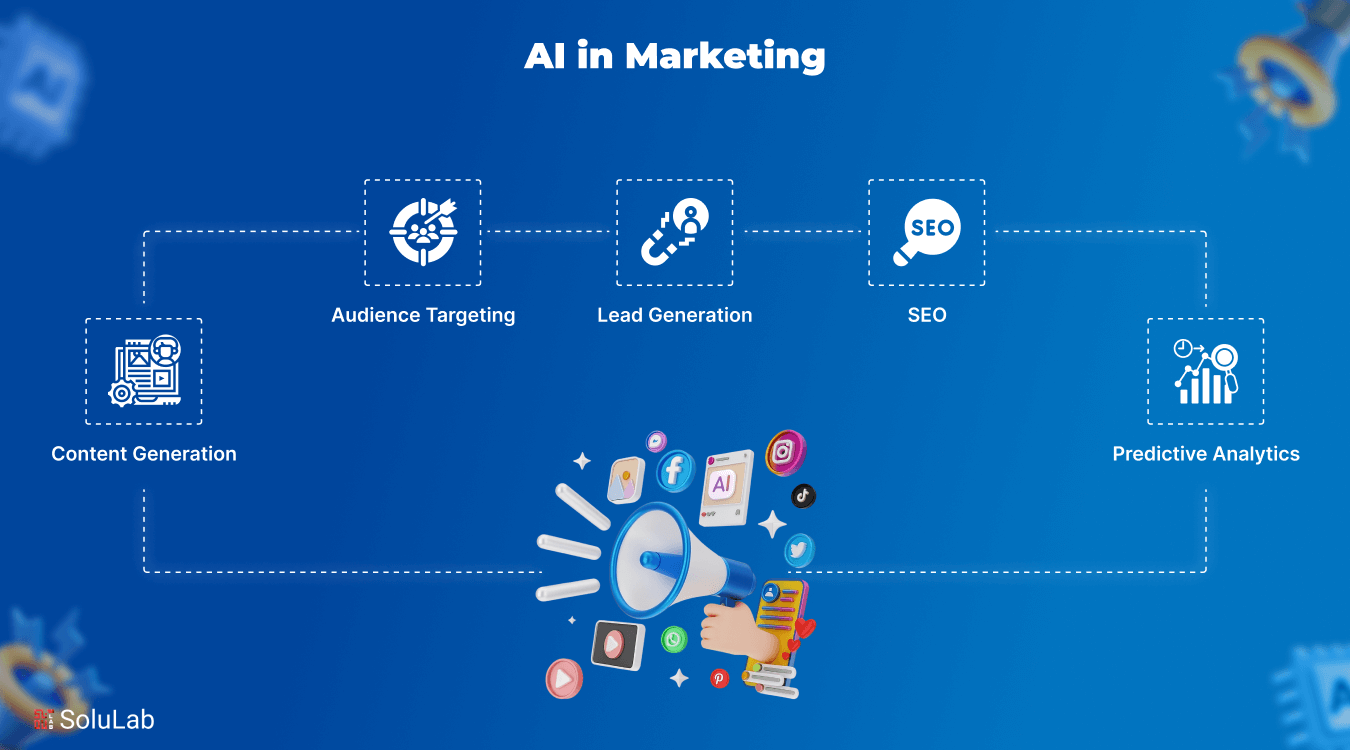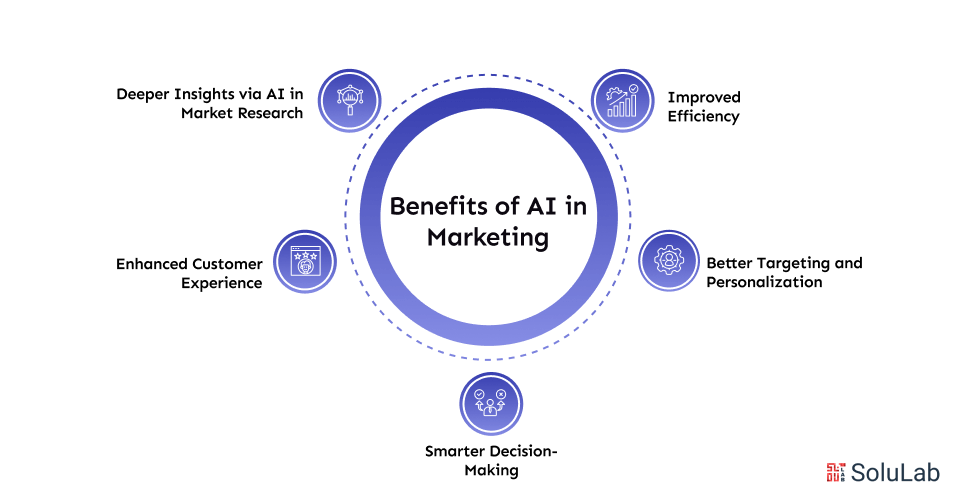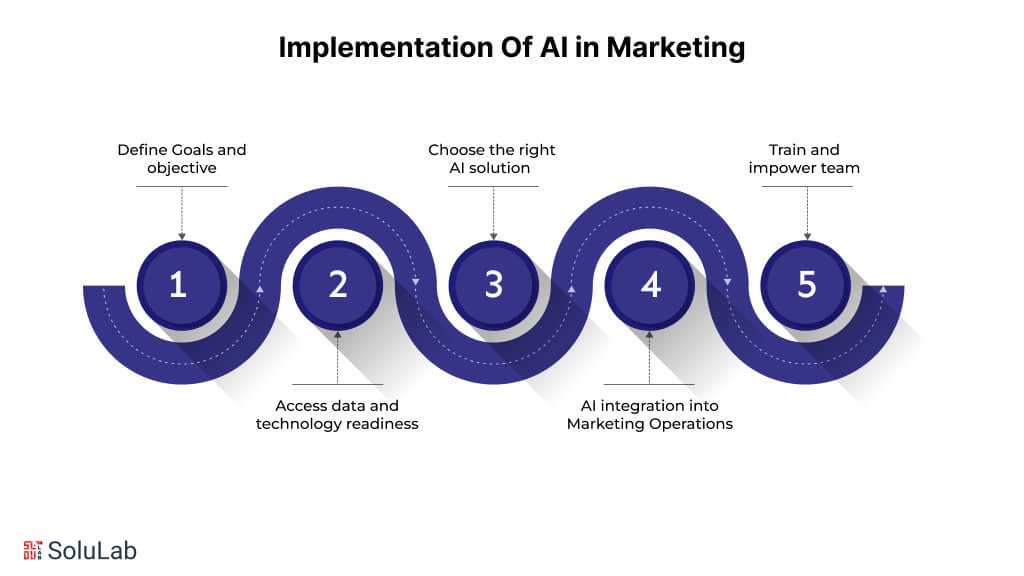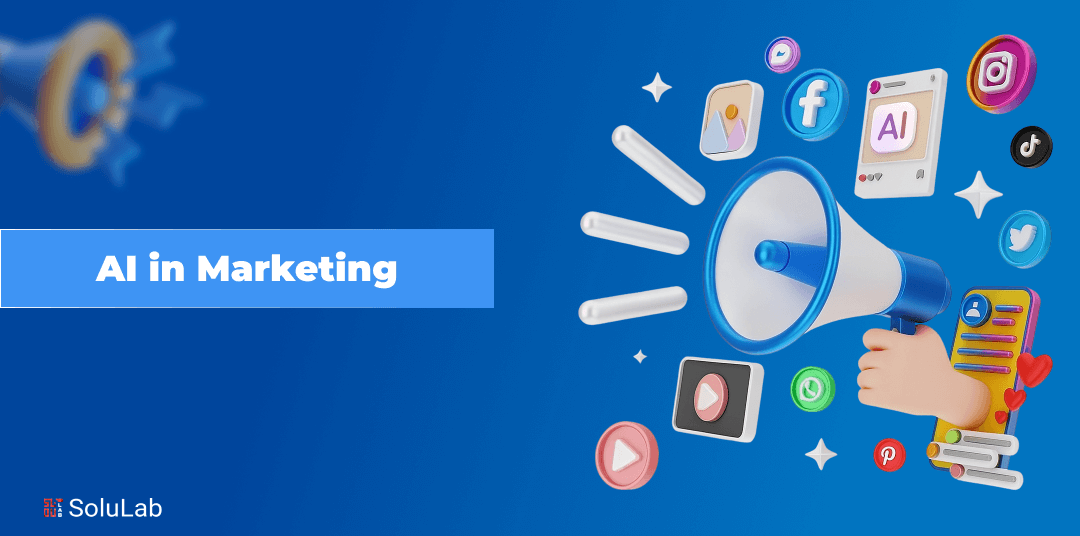
AI is changing how businesses connect with their audiences. It involves using artificial intelligence to develop, execute, and continuously improve your marketing strategy. Whether it’s optimizing email campaigns, boosting ad performance, or enhancing customer journeys, Artificial intelligence is improving marketing.
Especially in AI in B2B marketing, it offers powerful solutions for lead scoring, predictive analysis, and account-based marketing. But here’s the catch: AI is a tool, not a replacement. The smartest brands don’t rely on it blindly—they use it as an assistant.
This blog will explore how to leverage AI solutions in marketing smartly, how to implement AI in marketing, examples, and more.
What is AI in Marketing?
Artificial intelligence in marketing is the application of AI technologies to automate, optimise, and personalise different marketing activities. You can use AI to write blogs or social media captions or send email campaigns, and use AI to do customer segmentation, chatbots, and predictive analysis. Using AI to create custom coded email templates are hand-crafted email designs built using HTML and CSS.Unlike drag-and-drop editors, they give full creative and functional control.
A significant use of AI has been for market research, where the machine learning process to study consumer information and patterns of behavior is analyzed more efficiently compared to conventional methods. AI, in general, optimizes the process of making decisions, increases the workload of the staff, and opens the territory for more focused and efficient marketing policies.
The world market of AI has grown to 638 5billion in 2025, and by 2034, the world AI market is projected to attain 3.68 5trillion with a growth of ~19.2% CAGR.
Benefits of AI in Marketing

AI is changing how businesses connect with customers by bringing speed, precision, and personalization to every stage of the marketing funnel. Here are the key benefits of using AI in marketing:
1. Improved Efficiency: Reduce repetitive tasks with email campaign management services—precision targeting, automated A/B testing, and granular performance analytics so every campaign isn’t just sent, but strategically engineered for measurable growth. AI in marketing automation helps marketers save time and focus on creative strategies that drive results.
2. Better Targeting and Personalization: AI analyzes customer behavior and preferences to deliver highly targeted messages. This ensures more relevant content, increasing engagement, retention, and conversions.
3. Smarter Decision-Making: With predictive analytics and trend forecasting, AI in sales and marketing allows businesses to make data-driven decisions, optimize campaigns, and improve ROI.
4. Enhanced Customer Experience: AI-powered chatbots, recommendation engines, and voice assistants provide real-time support and personalized interactions, making the user journey smoother and more satisfying.
5. Deeper Insights via AI in Market Research: AI tools quickly process large datasets to uncover patterns, competitor strategies, and consumer trends, giving marketers a sharper edge in planning and execution.
Practical Use Cases of AI in Marketing
AI in marketing isn’t just about fancy tools, it’s about working smarter. From brainstorming ideas to personalizing user journeys, here’s how marketers are using AI in everyday tasks:
- Content Ideation and Optimization: Struggling with what to post next? AI can analyze trends, competitors, and audience interests to suggest fresh content ideas. It also helps refine tone, grammar, and structure so your blogs, emails, or captions connect with your audience. According to Coschedule, almost 75% of marketers believe AI gives them a competitive edge.
- Ad Enhancement and Targeting: AI helps craft better ad creatives, headlines, and copy by analyzing what clicks with your audience. It also fine-tunes targeting, ensuring your ads reach the right people at the right time, boosting ROI without wasting budget.
- Scaling A/B Testing: Testing two versions is great, but what if you could test ten? AI makes it possible to run A/B tests at scale, analyze results instantly, and suggest winning combinations you no longer need to put hours of manual effort.
- Intuitive Customer-Facing Chatbots: Gone are the days of robotic replies. AI-powered chatbots understand context, answer FAQs, recommend products, and even upsell—all while chatting like a human. It’s like having a 24/7 support team that never gets tired.
- SEO: AI tools simplify keyword research, optimize headlines, and improve meta descriptions. They even spot gaps your competitors are missing. AI becomes your behind-the-scenes SEO expert, helping you climb the search ranks faster. Many companies choose to partner with an experienced SEO agency or hire SEO experts who can translate AI-generated insights into practical, high-impact strategies.
- Personalization: AI helps you go beyond using just the customer’s name. It studies user behavior to serve product recommendations, email content, and even website layouts, to make customers feel like your brand “gets” them.
- Market Research: It can scan customer reviews, social media trends, and survey responses in minutes, giving you real-time insights to shape smarter marketing decisions.
How to Implement AI in Marketing?

Putting AI into your marketing strategy seems like a complicated and intimidating task, but when it is separated into several important steps, it becomes easier. So this is how you can begin:
1. Clarify objectives
Before using AI, know what you want. Is it what you desire to do for more customers? Boost sales? Enhance the experience of the client? It will offer you preconceived, measurable objectives that will also help you determine whether your AI marketing strategy is effective. The first thing to do is to try to target specific regions where AI can make the most significant impact and expand as you achieve success.
2. Grant Quality and accuracy of data
Remember that AI models learn from what is provided to them in data. To have greater insights and results of AI, there should be an investment in quality data.
3. The right tools should be selected.
Begin by looking at AI tools that are in line with your ambitions, whether it is mail automation, content generation, or predictive analytics. Marketers who undergo b2b marketing training are better equipped to select the right platforms and leverage AI capabilities effectively. It should have platforms that can be built with ease and have scalability as the marketer expands their networks.
4. Make customer experience a priority
Artificial intelligence must augment, but not replace, human interaction. Use it to make campaigns more customized and create anticipation of user needs, as well as decrease response time. An improved experience results in increased engagement and commitment in the long run.
5. Lay down a feedback loop in advance
Wait, don’t gather ideas. Keep real-time data and make use of AI to monitor and see what is working. The feedback from your team and customers on a regular basis can assist you in streamlining the strategies and keeping AI up to date and in place.
Real World Example of AI in Marketing
Here are some AI applications in marketing:
Example #1: Zomato – Personalized Push Notifications
Ever noticed how Zomato knows the exact moment your stomach starts growling? Right around lunch or late-night snack time, your phone buzzes with a tempting. That’s not just clever copy it’s AI at work.
Zomato tracks your order history, the time you usually order, your favourite dishes, and even your location. So if you’re a regular butter chicken fan from Delhi who usually orders dinner at 8 PM, Zomato’s AI gets that pattern. Come 7:45 PM, boom—there’s a push notification with your favourite restaurant’s special deal on butter chicken.
And it’s not just about timing. If it’s raining in your area, you might see: “Perfect weather for samosas and chai? It’s hyper-personalized marketing—Zomato’s way of whispering exactly what you want to hear, just when you want to hear it.
Example #2: Netflix – Content Recommendations
Do you feel like Netflix is reading your mind when it suggests your next show? That’s not magic—it’s machine learning at play.
Every time you watch something—whether it’s a crime thriller, romantic comedy, or a documentary—Netflix notes your preferences. Suppose you’ve been binge-watching true crime dramas lately. Netflix takes that as a cue and lines up more shows in that genre, complete with gripping thumbnails, dark color palettes, and intriguing taglines.
What’s more impressive is how Netflix adapts its artwork. If you’re into romance, that same thriller might show a tender moment on the cover. Prefer action? Expect to see a scene with explosions or intense chase sequences. This isn’t random—it’s Netflix customizing your entire experience based on what makes you click “play.”
Example #3: Amazon – Pricing & Product Suggestions
Ever wondered how Amazon always tempts you with things you didn’t know you needed until you saw them?
You bought a yoga mat, and suddenly there’s a deal on resistance bands, water bottles, and athleisure wear. That’s AI doing its thing—like your personal shopping assistant who never sleeps.
Amazon’s AI looks at your past purchases, search behaviour, wish lists, and even what others with similar buying habits are purchasing. It then curates your home screen to show you what you’re most likely to buy next.
That same yoga mat may cost you ₹899, but someone browsing from a different city or at a different time might see it for ₹849. Amazon adjusts prices in real-time based on demand, competition, and even how many times you’ve viewed a product.
Future of AI in Marketing
AI won’t just assist with tasks like content creation or ad targeting; it will predict what your audience wants before they even know it.
The new thing will be hyper-personalization. Think about sending emails that are always written differently depending on how a reader feels or what they have bought. Within seconds of analysing tremendous volumes of data, AI will enable brands to make swift choices and be ahead of trends.
Voice, visual will be a part of routine strategies. It will not just be moving tools into the automation; the tools will become thoughtful associates. It can also help change background elements from images to create cleaner, more professional-looking graphics.
Furthermore, expect AI-powered interactions that feel more human than ever—chatbots that understand tone, context, and emotion.
Conclusion
The generative AI in marketing revolution is reshaping the ways brands interact, customize, and expand campaigns. And it is not optional anymore, AI is a must as it leads to smarter content creation and even a hyper-personalized experience. Companies that are interested in remaining relevant should leverage the change and incorporate AI into their marketing processes.
This is something that can be accomplished more efficiently and sooner when a fitting AI app development company is teamed up. It is time to embrace the strength of AI to develop a more relevant, targeted, and meaningful marketing strategy that will really resonate with the target audiences.
Digital Quest, a travel business, partnered with SoluLab to develop an AI-powered chatbot using Generative AI. The chatbot enhanced customer engagement by offering real-time, personalized travel recommendations and hassle-free reservations. It also integrated user feedback and multi-language support, resulting in improved user experience and high ROI.
SoluLab, an AI development company, can help you create and deploy campaigns using AI and scale your business. Contact us today to discuss further.
FAQs
1. How does AI improve email marketing campaigns?
AI analyzes open rates, click-through data, and user behavior to personalize subject lines and content. It ensures emails are timely and relevant—key elements of successful AI in content marketing strategies.
2. How can AI help with customer segmentation?
AI analyzes large datasets to group customers based on behavior, preferences, and purchase history. This enables more personalized targeting, a major advantage of AI in sales and marketing.
3. What is the role of AI in ad targeting?
AI identifies ideal customer profiles, predicts click behavior, and automatically adjusts ad placements for better performance. It makes ad spending more efficient by using AI applications in marketing.
4. How is AI transforming healthcare marketing?
AI in healthcare marketing is used to personalize patient communication, predict healthcare needs, and automate appointment reminders. It helps build trust and increase engagement in a highly sensitive industry.
5. How do I choose the right AI app development company?
Look for a company with experience in AI application development, strong case studies, and a clear understanding of your business needs. The right partner ensures smooth integration and long-term value.







